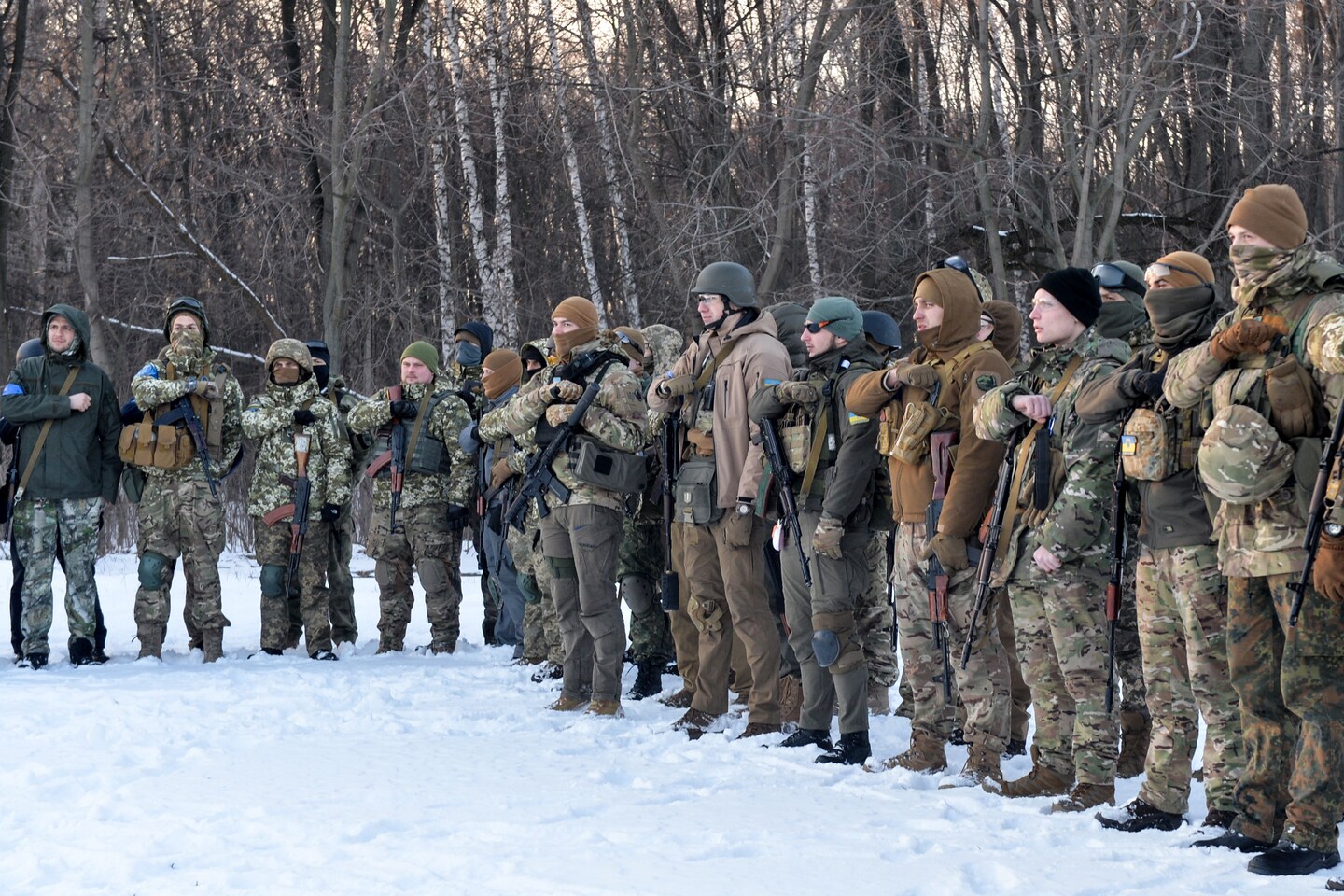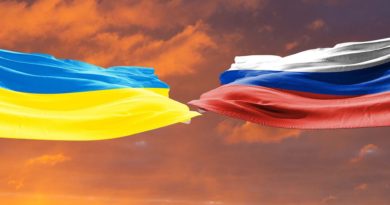Russia’s war in Ukraine galvanizes far-right extremists in Germany, with some traveling to join the fight

The clashing nationalist appeals have inspired extremists in other countries to take sides in the conflict — and to seek combat experience that could incite violence far from today’s front line. Nowhere does that raise louder alarms than in Germany, where making amends for Nazi crimes has meant subordinating national aims to those of a multinational European community. Now, the month-long war has galvanized hard-liners, from neo-Nazis supporting paramilitary factions to militant Islamists who see cracks in Western power.
“My biggest concern is that these extremists get combat training with weapons and explosives and, because of the war experience, have a very low threshold for using weapons and lethal force,” said Stephan J. Kramer, the head of the domestic intelligence agency in the German state of Thuringia.
In Germany, the number of far-right extremists crossing into Ukraine is still minimal, according to Germany’s Interior Ministry. So far, just 27 either have traveled to Ukraine or made plans to do so, authorities said this week, among 33,300 far-right extremists estimated to be in the country, with 13,000 assessed to be inclined to violence. Authorities said there was no evidence any had seen combat.
But active online recruitment suggests that a drawn-out conflict could attract many more volunteer fighters, Kramer said. Readiness to take up arms, he added, reflects intensifying activity by right-wing extremists, including within the ranks of the German military.
For neo-Nazis and white supremacists, “Ukraine could become their version of what Afghanistan was for the jihadi movement in the 1980s,” said Steven Stalinsky, the executive director of the Washington-based Middle East Media Research Institute. “Being on the ground in a real-world fighting situation will allow them to gain valuable experience, as they further hone their skills in weapons, planning attacks, using technology in war including communications and encryption, and using cryptocurrency for clandestine funding of their activity.”
The potential for the war in Ukraine to accelerate extremist activity throughout the West is all the more noteworthy because of the Kremlin’s long-standing campaign to cultivate fringe movements and undermine democracies abroad, said Stefan Meister, a Russia specialist at the German Council on Foreign Relations. Those efforts, whether through financial support or fantastical online conspiracy theories, have earned Moscow sympathy across broad swaths of the far right, he said.
Now, contrary to the Russian president’s claim that denazification justifies his invasion, neo-Nazis in Germany and beyond aren’t casting their lot with Ukraine alone, say security and intelligence officials. Rather, the conflict has exposed a rift among extremists.
Some are backing Ukraine’s struggle for sovereignty, but many others are aligning themselves with Putin’s chauvinist, anti-American crusade — one aimed at a head of state, Volodymyr Zelensky, who is Jewish. Radicals of all stripes, including not just neo-Nazis but also Islamist extremists, are shaping the tumult of the war to fit their own propaganda.
“The war is a threatening and therefore emotional situation, causing fear in large parts of society,” Kramer said. “In such a state of fear, many people are open to promises of salvation and strong leaders offering easy solutions and answers. It also feeds preconceptions, stereotypes and conspiracy fantasies.”
‘We are talking about action’
Warfare is just one of the aims motivating German extremists crossing into Ukraine.
Some also seek to conduct independent reporting — bypassing what they see as the lügenpresse, or lying press, a slur used by Hitler as he consolidated power in interwar Germany. Others have plans to provide humanitarian assistance to nationalist families, according to officials and posts on social media and messaging apps.
Among the extremists who have crossed into Ukraine but since returned, according to a German security official, is a man who said he went to conduct research for an article he was planning to write for Der Dritte Weg, or the Third Path, the neo-Nazi party circulating the pro-nationalist graphic on its Telegram channel. The German official, who was briefed on the issue, spoke on the condition of anonymity because of the matter’s sensitivity.
Other extremist channels feature pro-Russian communications. A group called Free Saxony recently told its followers that the conflict was “largely fueled by NATO,” condemning smear campaigns against “friends of Putin.”
In some instances, Russian groups have glorified extremist support for the war that is being expressed worldwide. The Russian Imperial Movement, a militant far-right faction designated a terrorist organization by the United States, brought attention on social media to a convoy in Belgrade, Serbia, in which ultranationalists and neo-Nazis flew the Russian flag. “The car rally successfully made its way through Belgrade, reaching at the end the Russian embassy, where the Serbian people once again loudly expressed their support,” read the Russian Imperial Movement’s announcement, according to a report from the Middle East Media Research Institute shared with The Washington Post.
Michael Kretschmer, the premier of Saxony, the eastern German state seen as a center of right-wing organizing, said warnings about recruitment should prompt tighter regulation of online communications. He singled out Telegram, among the most popular messaging services in Ukraine and Russia, and favored, too, by far-right groups globally. Kretschmer, a member of the center-right Christian Democratic Union, said the messaging app, known for its hands-off approach to content moderation, “has to be regulated so that it works according to our laws.”
Germany has among the world’s strictest rules against hate speech and online harassment. It was only last month, however, that its broadcasting regulator banned the Russian broadcaster RT’s German-language channel. The challenge of differentiating among types of far-right hate also was on display when Facebook said it would allow praise for Ukraine’s Azov Battalion — but only in the context of its defense of Ukraine.
Azov’s prominence presents problems for Western powers. “These people should not be presented as hero figures, nor should they become the new normal,” said a Western intelligence official, speaking on the condition of anonymity to address sensitive details. “It is giving Putin an excuse to speak about fighting extremists, but it is also endangering stability long term.”
The official drew a comparison to U.S. support for the anti-Soviet mujahideen fighting in Afghanistan in the 1980s. In Germany, concerns about recruitment recall that extremists traveled to fight in the Kosovo War in the late 1990s, said Konstantin von Notz, a member of the Green party who serves as vice-chairman of the German parliament’s intelligence oversight committee.
More recently, authorities estimated that more than 1,000 German citizens traveled to Iraq and Syria to join Islamic State militant groups. And in Ukraine, hostilities preceding Putin’s full-scale invasion drew not just right-wing nationalist sympathizers but also Chechen Muslim fighters.
“From the history of the Azov Regiment, we know that a number of right-wing extremists traveled from Europe and Northern America to Ukraine in the past years and fought with the regiment at the various hot spots in the region,” said Kramer, the intelligence chief in Thuringia. “So we are talking about action and not just loudmouths.”
Von Notz, a lawyer, said he expected that German prosecutors probing possible Russian war crimes also would hold to account German citizens found to have violated international law in Ukraine. Holding foreign fighters accountable means obtaining their names from Ukraine’s Territorial Defense Forces, said Caspar Schliephack, a Berlin-based scholar and consultant on religious radicalization.
“It’s nearly impossible to stop people from going since you cross the Polish border and then the Ukrainian border and then you are there,” he said. Giving Germany access to Ukrainian records, he said, “is one very, very important point in order to be prepared when those who arrive, who fought, who trained at one point decide to come back.”
‘Creating a narrative’
Extremists not entering Ukraine’s battlefields are nevertheless using the war to spread propaganda.
Some are white supremacists who see in Putin’s crusade an opportunity to cleanse Western culture. This view is disseminated by an American in Moscow — and frequent guest on Russian state television — who wears a patch on his vest showing Putin’s face set against a Confederate flag, according to analysis by the Middle East Media Research Institute.
The expatriate recently asked on Instagram, “you think we give a [expletive] that the entire world hates Russia now?”
Others are Islamist extremists who are using the war to highlight what they see as Western hypocrisy. Anjem Choudary, who was convicted in Britain in 2016 for inspiring support for the Islamic State, asked on his blog this week, “why don’t the US and UK, with the consent of NATO, just bomb the ordinary people of Ukraine in order to liberate them from Putin’s occupation just like they did in Iraq in 2003?”
Some Islamist extremists have backed Ukraine, condemning Chechen Muslim fighters who have taken up arms for Putin, according to analysis by the Anti-Defamation League. Others see both sides as nonbelievers and are encouraging their mutual annihilation. Meanwhile, white supremacists who decry the conflict as a war between “brothers” say there is no advantage in the deaths of fellow White people.
“What we are finding concerning is the use of the war for their own narratives,” said an Arab intelligence official, speaking on the condition of anonymity to discuss sensitive findings. “There are those who want to compare the situation of Ukraine to the situation of Palestinians and say if the West is willing to send weapons to Ukraine and support the fight there against the Russians, why weren’t they willing to support the Palestinians?”
That the war divides extremist groups, however, could undermine its potency as a tool of radicalization, some experts said. Jan Rathje, an analyst at the Center for Monitoring, Analysis and Strategy, a Berlin-based digital forensics nonprofit, examined the 10 largest German-language Telegram channels spreading conspiracy theories and found a wide range of views on the war in Ukraine.
The disunity, Rathje said, stands in stark contrast to the consensus forged by hostility to public health measures aimed at controlling the spread of covid-19.
“For many in the conspiracy milieu, the war is a useful tool of propaganda,” he said, “but not as useful as masks and vaccines.”
William Noah Glucroft contributed to this report.


